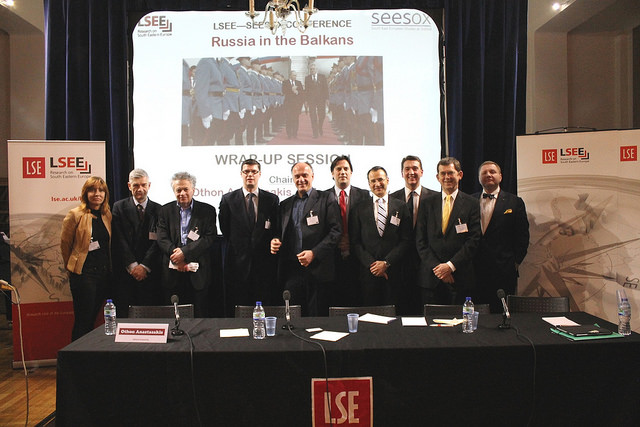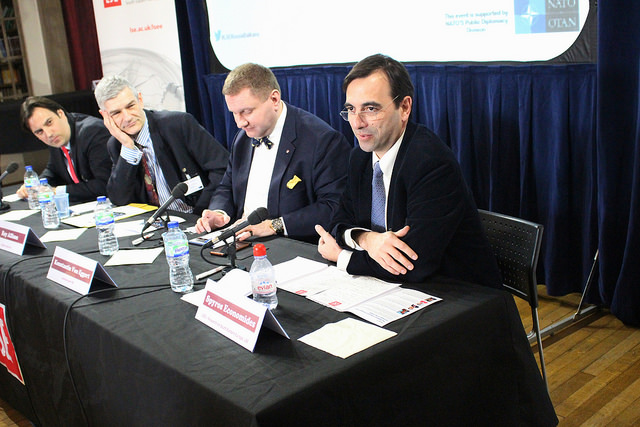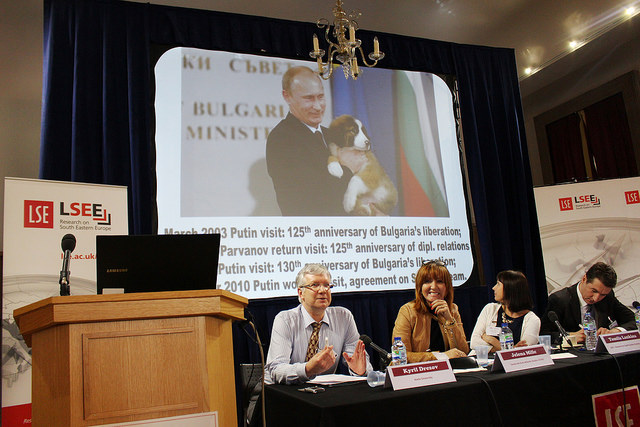 The pragmatic interests of the Balkan states – which lie in the direction of Europe – are imposing limits on the Kremlin’s drive to regain influence in the region. Dimitar Bechev summarises the Russia in the Balkans conference organised by LSEE Research on South Eastern Europe and SEESOX (South East Europe Studies at Oxford) on Friday, 13 March.
The pragmatic interests of the Balkan states – which lie in the direction of Europe – are imposing limits on the Kremlin’s drive to regain influence in the region. Dimitar Bechev summarises the Russia in the Balkans conference organised by LSEE Research on South Eastern Europe and SEESOX (South East Europe Studies at Oxford) on Friday, 13 March.

As Russia and the West clash over the fate of Ukraine, will the next battleground be in the Balkans? The hero’s welcome that President Vladimir Putin received in Belgrade in mid-October raised eyebrows across EU capitals, as did the reluctance of Serbia and next-door Macedonia to join the Western sanctions.
Rising anxiety has led to a flurry of tough statements, including from the European Union’s foreign and security chief, Federica Mogherini, whom many have seen as a soft-liner, as well as German Chancellor Angela Merkel.
The message to the Kremlin: keep out from ex-Yugoslavia, this is EU turf. European concerns resound across the pond, too. The US Secretary of State, John Kerry, who visited Sofia in January, recently opined that, thanks to historic links with Russia, Serbia, Macedonia, Montenegro and Kosovo were “in the line of fire”, just like the Baltic states, Georgia, Moldova and Transnistria.
In reality, relations between Belgrade and Moscow carry the “it’s complicated” tag. Russia’s cancellation of the South Stream gas pipeline last December was a sobering reminder of the pitfalls of cosying up to Russia and triggered tensions, albeit under the surface.
Balkan watchers are taking note of Serbia’s extensive coverage of Prime Minister Aleksandar Vucic’s decision to contract former British Prime Minister Tony Blair as an advisor.

For all the rhetoric about a shared past, Slavic brotherhood and Orthodox links – readily embraced by the global media – the Balkan countries have pursued pragmatic policies. These are more than matched by the Kremlin whose moves also are driven by self-interest and by domestic political considerations than by historical attachments.
That was one of the key messages heard at a conference on Russia in the Balkans held by LSEE-Research on Southeast Europe and South East European Studies at Oxford, SEESOX, last Friday.
Gathering academics, government officials, journalists and business people, the event was an opportunity for students of Southeast European affairs to compare notes with some of Russia’s top political analysts.
The panels ranged from the Balkans’ place in Moscow’s overall foreign policy to Russian involvement in Bosnia and Herzegovina and Kosovo, and from energy politics and Russia’s investment in the local economies to its cultural appeal in Bulgaria, Serbia and the rest of South East Europe.
Some of the key points worth highlighting were:
1. Russia is back to the Balkans in order to score points against the West by exploiting loopholes and blind spots in its policy. Unlike with Russia’s “near abroad”, the overarching goal is not to roll back NATO and EU enlargement but to build influence in countries that are either part of Western clubs, or are well on their way to joining them, and are therefore useful “door openers”.
2. Russia may lack a long-term vision but is an accomplished tactical player and, unlike its competitors, takes swift decisions and acts flexibly. The Kremlin distrusts local elites but then, as a colleague from Moscow put it, it “does not trust in trust” in the first instance, preferring money and coercion. In a crisis-stricken Balkans, rife with clientelism and state-capture, it is mostly the money that comes into play. What is more, funds channelled into Southeast Europe find their way back to the Kremlin establishment, which both rules and owns Russia.

3. Starting from the late 1990s, Russian energy firms such as Lukoil and Gazprom have made inroads into Bulgaria, Romania, Serbia and Bosnia and Herzegovina. Over time, the Kremlin has harnessed economic interdependence. Yet, a leading position in the oil sector and a monopoly in gas does not always bring it political leverage. Montenegro, where a third of all registered companies are linked to Russia, joined EU sanctions on Russia. Furthermore, investment by Russia, including in such sectors as banking, real estate, tourism, is dwarfed by that of the EU. Also, gas plays a minor role in the region’s energy consumption, so dependence on Russia should not be over-estimated. However, Balkan elites bet on the failed South Stream as a great commercial and political opportunity and took a hit when the pipeline was called off.
4. While few Russians in the 1990s could tell a Serb from a Croat, Putin has turned Kosovo into a key part of the narrative concerning the West’s humiliation of Russia. Its setback in 1999 and 2008 is a “scratch that Putin chose to turn into a wound”. The Balkans are central to the Kremlin’s narrative about the post-Cold War normative order being broken, which is deployed both externally and inside Russia as part of the regime’s quest for legitimacy. Any diplomatic and political breakthroughs in the Balkans win plaudits domestically and partly offset losses in the post-Soviet space.
5. Russia and Putin personally enjoy popularity in Serbia and other Balkan countries because of the resentment felt towards the West over the dissolution of Yugoslavia in the 1990s. Muscular foreign policy resonates with a deep-seated view that “might is right”, only that this time around the West is on the receiving end. But, when the push comes to shove, elites and citizens in the region opt for the EU and the West – a fact well understood by Russian policymakers.
6. Russia has soft power in the Balkans but it is uneven. With the possible exception of Bulgaria, Russian is not widely read or spoken in the region. Yet, the rhetoric of brotherly ties coupled with a shared sense of victimhood bolsters Russia’s moves and initiatives.
Note: This article gives the views of the author, and not the position of LSEE Research on South Eastern Europe, nor of the London School of Economics.
This article was originally published on BalkanInsight.
Videos of the Conference:
_____________________
Dimitar Bechev is Visiting Fellow at LSEE Research on South Eastern Europe, London School of Economics (LSE), and lectures in international politics at Sofia University. He was formerly Director of the Sofia Office at the European Council on Foreign Relations (ECFR) where he covered Turkey and the Western Balkans.




4 Comments